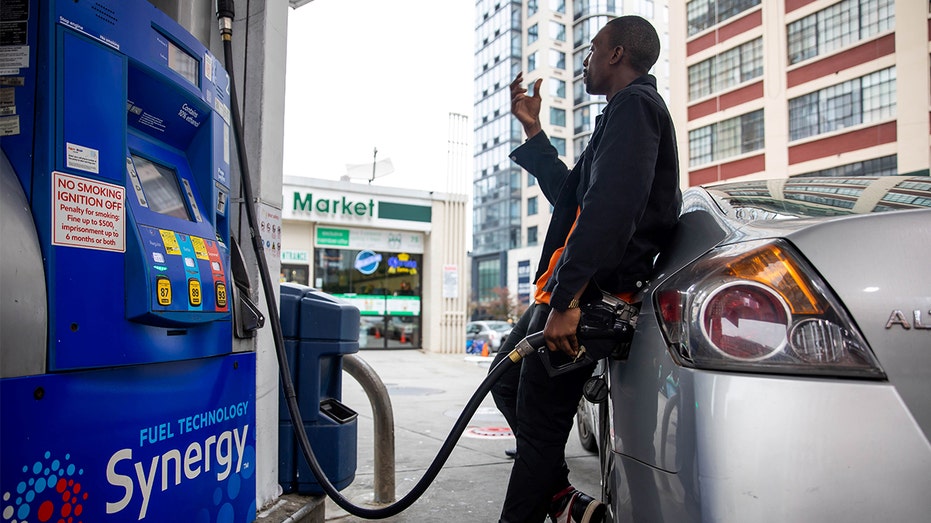Biden to release 50M barrels of oil from Strategic Petroleum Reserve amid gas price spike
China, India, Japan the Republic of Korea and the United Kingdom will also tap their reserves in a coordinated effort to drive down prices
Fox Business Flash top headlines for November 23
Check out what's clicking on FoxBusiness.com.
President Biden said the Department of Energy will release 50 million barrels of oil held in the U.S. Strategic Petroleum Reserve, as Americans pay more for gas now than they have in years.
China, India, Japan the Republic of Korea and the United Kingdom will likewise tap their reserves in a coordinated effort to drive down prices.
Of the 50 million barrels, 32 million will be released but eventually returned to the Strategic Petroleum Reserve in the next few years, the White House said. The remaining 18 million barrels are part of a sale that Congress has already authorized; the White House said it was accelerating the release of that sale.
PHIL FLYNN: TAPPING US SPR WILL MAKE OIL SUPPLY SITUATION WORSE
"The President stands ready to take additional action, if needed, and is prepared to use his full authorities working in coordination with the rest of the world to maintain adequate supply as we exit the pandemic," the White House said in a statement Tuesday.

A man fuels a car at a gas station in New York, on Oct. 13, 2021. (Photo by Xinhua via Getty Images) (Xinhua via Getty Images / Getty Images)
Biden's pressure on 14-nation OPEC and Russia to pump more supply into the global market has so far had little effect. The administration has blamed higher prices in part on the effects of the economy recovering and restarting from the COVID-19 pandemic. It has also singled out energy companies for alleged anti-competitive behavior. Biden last week asked the Federal Trade Commission to investigate whether "illegal conduct" is driving up prices at the pump for Americans.
| Ticker | Security | Last | Change | Change % |
|---|---|---|---|---|
| XOM | EXXON MOBIL CORP. | 151.13 | +2.11 | +1.42% |
| CVX | CHEVRON CORP. | 182.60 | +1.74 | +0.96% |
| RDS.A | NO DATA AVAILABLE | - | - | - |
| BP | BP PLC | 39.22 | +0.21 | +0.54% |
| COP | CONOCOPHILLIPS | 108.70 | +1.08 | +1.00% |
"There is mounting evidence that declines in oil prices are not translating into lower prices at the pump," the White House said Tuesday.
CLICK HERE TO READ MORE ON FOX BUSINESS
Americans paid an average of $3.29 per gallon in October, according U.S. data, the highest since September 2014.
Energy Secretary Jennifer Granholm on Tuesday touted the action to tap into the Strategic Petroleum Reserve.
"As we come out of an unprecedented global economic shutdown, oil supply has not kept up with demand, forcing working families and businesses to pay the price," Granholm said. "This action underscores the President’s commitment to using the tools available to bring down costs for working families and to continue our economic recovery."
The Department of Energy explained that the exchange will be conducted with crude oil from all four SPR storage sites, noting that an exchange is "a mechanism specifically suited to the current economic environment, where markets expect future oil prices to be lower than they are today."
"The exchange creates a bridge from today’s high price environment to a period of lower prices, and automatically provides for restocking the SPR over time," the Energy Department said.
As of Nov. 19, there are 604.5 million barrels in the U.S. Strategic Reserve, according to the Department of Energy.
In 2020, the United States consumed an average of about 18.19 million barrels of petroleum per day, or a total of about 6.66 billion barrels of petroleum-- the lowest level of annual consumption since 1995. The drop in consumption in 2020 from 2019 was the largest recorded annual decline in U.S. petroleum demand., and was largely the result of the global response to the COVID-19 pandemic, according to the U.S. Energy Information Administration.
GET FOX BUSINESS ON THE GO BY CLICKING HERE
Meanwhile, the White House said the move Tuesday reflects on Biden's "commitment to do everything in his power to bring down costs for the American people and continue our strong economic recovery," while maintaining the administrations commitment to Biden's "ambitious clean energy goals," which are included in both the bipartisan Infrastructure Law Biden signed last week, and his Build Back Better agenda, which the House of representatives passed last week.
The White House said both spending packages represent "the largest investment in combatting climate change in American history and is a critical step towards reaching a net-zero emissions economy by 2050 and reducing our dependence on foreign fossil fuels."




















